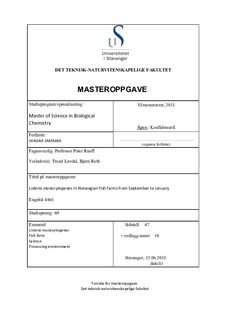Listeria monocytogenes in Norwegian fish farms from September to January
Master thesis
Permanent lenke
http://hdl.handle.net/11250/2568132Utgivelsesdato
2018-06Metadata
Vis full innførselSamlinger
Sammendrag
The Norwegian food industry is best known for salmon production and distribution to over 70 countries. Salmon processing factories are susceptible to the establishment of the pathogen bacterium Listeria monocytogenes, which may cause the life-threating infection listeriosis. Due to its ubiquitous nature, it is a great challenge for companies to curtail the spread of L. monocytogenes in the processing environment of the company. The purpose of this master thesis is to investigate the prevalence of bacteria in five Norwegian fish farms for Atlantic salmon (Salmo salar). Sampling was performed from September 2017 to January 2018. The samples were taken from fish and seawater. The total number of tested samples was 126. For Listeria detection, the sensitive NMKL 136 method with a detection limit of 2 -20 cfu/L was used. Suspected Listeria colonies were examined using an API Listeria kit. The results were negative for the presence of L. monocytogenes for all examined samples. Despite this, the raw fish entering the processing plants are possible risk sources for finished product contamination with the bacterium L. monocytogenes. Based on the results produced by the present study, seawater and fish raw material do not pose a high contamination risk for food processing factories, taking into consideration that sampling was performed during the autumn and winter seasons. However, the undetectable amounts of L. monocytogenes in fish raw material and in seawater establish the niches in the processing environment which may lead to finished product contamination during processing and thus pose a danger to the life and health of consumers. The risk factors, the route of bacterial transmission and the control methods are discussed.
Beskrivelse
Master's thesis in Biological chemistry
